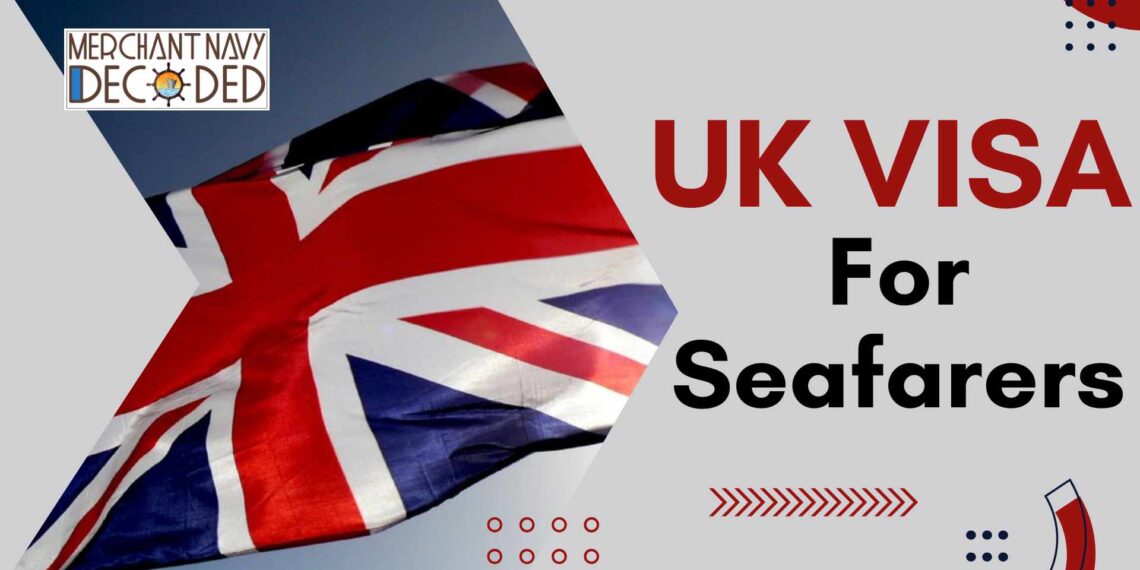UK Visa for Seafarers
Table of contents
- 1. Overview
- 2. Documents Required for UK Visa
- 3. UK Visa fee
- 4. Difference Between Visitor, Study, and Work Visa
- 5. Seafarer Visa for the UK
- 6. Seafarer Visa Requirements
- 7. Countries with ILO Ratification
- 8. Top 10 Reasons for the Rejection of UK Visa
- 8.1 Insufficient Funds
- 8.2 Incomplete or Incorrect Information
- 8.3 Suspicious Travel History
- 8.4 Lack of Strong Ties to Home Country
- 8.5 Incomplete Travel Plans
- 8.6 Criminal Record or Security Concerns
- 8.7 Applying for the Incorrect Visa Category
- 8.8 Unclear Purpose of Visit
- 8.9 Health Issues
- 8.10 Overstay Risk
- 9. FAQ
1. Overview
If you are planning to work as a seafarer in the UK, it is important to have a thorough understanding of the documentation and requirements set by the UK.
This blog will provide essential information on the necessary documents, reasons for rejection, and key considerations for different situations. Whether you are a first-time applicant or have had a previous visa rejected, this blog will guide you through the process and help you avoid any potential pitfalls.
So, let’s dive in and explore the regulations set by the UK for obtaining a UK Seafarers Visa.
2. Documents Required for UK Visa
Depending on the type of visa you’re seeking, different documents are needed for a UK visa. However, typical documents frequently consist of:
- Valid Passport
- Completed Visa Application Form
- Passport-sized Photographs
- Proof of Financial Means (e.g., bank statements)
- Accommodation Details
- Flight Itinerary
- Proof of Employment or Studies
- Travel Insurance
- Biometric Information (fingerprint and photo)
- Additional Requirements (varies by visa type)
Ensure all documents are genuine, up-to-date, and meet the specific requirements for your visa application
3. UK Visa fee
UK Visa application fees vary on the type of visa you want to apply for. We have mentioned the suggested visa type for you, for further information, you can refer to the UK official website for the same:
| Visa Type | Type | Application fees (INR) |
| Visiter | Short-term (up to 6 months, single or multiple entry) | ₹12,627 |
| Visiter | Visiting academic – more than 6 months up to 12 months | ₹21,959 |
| Study | Student – main applicant and dependants | ₹53,801 |
| Work | Offshore worker | ₹69,941 |
Ready to become an Engineer/Officer from GP Rating? Check out the guide by Merchant Navy Decoded
4. Difference Between Visitor, Study, and Work Visa
| Category | Purpose | Duration | Eligibility Criteria |
| Visitor | Short-term visits for tourism or family | Up to 6 months | Must demonstrate intent to leave the UK at the end of the visit, sufficient funds for the trip, and ties to home country. |
| Study | Pursuing education at a UK institution | Depends on course | Admission to a recognized institution, sufficient funds to cover tuition and living expenses, and proficiency in English. |
| Work | Employment or business ventures | Varies | Job offer from a UK employer with a valid sponsorship, specific skill set or qualifications required for the role, and compliance with immigration rules. |
5. Seafarer Visa for the UK
Sailors must understand the requirements and application procedure for visas before entering or passing through the United Kingdom. The purpose of this blog is to give a thorough overview of the regulations that are specific to seafarers in the UK, including the types of visas that are required, the documents that are required, and the reasons for rejection.
6. Seafarer Visa Requirements
- Section 8(1) of the 1971 Immigration Act covers seafarers coming to the UK on ships and defines terms like “ship,” “captain,” and “crew.”
- Additionally, sailors must carry either a valid passport or a sailor’s Identity Document (SID) to enter the UK without a visa.
- They may, however, apply for a joining ship visa if they do not have a compliant SID.
7. Countries with ILO Ratification
- Seafarers traveling on contract to join a ship in the UK must obtain entry clearance unless they possess a document issued by a country that has accepted the 1958 International Labour Organisation (ILO) Seafarers Identity Documents Convention No. 108.
- The UK has agreed to a new convention, ILO185, but has yet to ratify it. A list of nations that have ratified the conventions is available for reference.
8. Top 10 Reasons for the Rejection of UK Visa
Rejecting a UK visa application can be a sad and difficult process, especially if one has made arrangements to visit the United Kingdom. Understanding the most popular causes for visa refusal might help applicants better prepare and boost their chances of success.
8.1 Insufficient Funds
One of the most common causes for UK visa rejection is a failure to present proof that one has sufficient financial resources to meet the trip’s expenditures. This includes things like lodging, transportation, and daily living costs. Applicants must demonstrate that they have sufficient finances to maintain themselves throughout their stay in the UK without relying on public assistance.
8.2 Incomplete or Incorrect Information
Providing false or missing information on the visa application form can result in rejection. Fill out all areas of the application accurately and truthfully, and send all relevant papers. Failure to do so may cast doubt on the applicant’s trustworthiness and intentions.
8.3 Suspicious Travel History
Applicants with a history of visa denials, overstays, or irregular travel patterns may face scrutiny from immigration officials. Such travel history may raise questions about the applicant’s motives and integrity, resulting in a visa refusal.
8.4 Lack of Strong Ties to Home Country
Immigration officials evaluate an applicant’s ties to their home country to determine their likelihood of returning following their visit to the UK. Lack of evidence of stable job, property ownership, or familial commitments in the home country may cast doubt on the applicant’s intention to return, resulting in visa refusal.
8.5 Incomplete Travel Plans
Applicants must give a clear and complete travel schedule, including details on lodging, transportation, and the purpose of their visit. Please present such information, as well as conflicting or unclear travel arrangements, to avoid a visa refusal.
8.6 Criminal Record or Security Concerns
Applicants having a history of criminal convictions or connections to security threats may be denied admission to the UK. Such applicants are more likely to have their visa applications denied due to concerns about public safety and security.
8.7 Applying for the Incorrect Visa Category
It is critical to apply for the correct visa category based on the purpose of your visit to the UK. Applying for the incorrect visa category or providing an insufficient reason for the specified category may result in visa refusal.
8.8 Unclear Purpose of Visit
Applicants must present a clear and convincing explanation for why they are visiting the United Kingdom. Failure to do so may raise questions about the applicant’s intentions, resulting in visa refusal.
8.9 Health Issues
Applicants who do not meet the health conditions for entrance into the UK may have their visa applications denied. This includes people with infectious diseases or who do not meet the basic health requirements set by UK immigration officials.
8.10 Overstay Risk
Applicants who have previously overstayed their visas or violated immigration regulations may be considered high-risk by immigration officials. Such candidates are more likely to have their visa applications denied due to concerns about their compliance with immigration procedures.
9. FAQ
Q1. Can seafarers apply for a UK visa?
Ans. Yes, seafarers can apply for a UK visa, provided they meet the eligibility criteria and submit the required documents to support their application.
Q2. What documents are required for a UK seafarers visa?
Ans. Documents required for a UK seafarer’s visa include a valid passport, seafarer training certificates, employment contract, letter of sponsorship from the employer, proof of financial means, and any additional documents requested by UK immigration authorities.
Q3. How long does it take to process a UK seafarer’s visa application?
Ans. The processing time for a UK seafarer’s visa application varies depending on factors such as the applicant’s country of residence, the type of visa applied for, and the volume of applications being processed. Generally, it can take anywhere from a few weeks to several months for a visa application to be processed.
Q4. What are the common reasons for rejection of a UK seafarers visa application?
Ans. Common reasons for rejection of a UK seafarer’s visa application include insufficient documentation, incomplete or inaccurate information provided in the application, failure to meet the eligibility criteria, concerns about the applicant’s intention to return to their home country, and security or health issues.
Q5. Can seafarers reapply for a UK visa after rejection?
Ans. Yes, seafarers can reapply for a UK visa after rejection, but they must address the reasons for the previous rejection and provide additional supporting documentation or information to strengthen their application.
Q6. Is a UK seafarer visa valid for multiple entries?
Ans. The validity and entry conditions of a UK seafarer’s visa depend on the type of visa issued and the terms specified by UK immigration authorities. Some visas may allow for multiple entries, while others may be valid for a single entry only.
Q7. Can seafarers work on UK-flagged vessels with a seafarers visa?
Ans. Seafarers with a valid UK seafarers visa may be permitted to work on UK-flagged vessels, subject to the terms and conditions of their visa and any applicable employment regulations.
Q8. Are there any age restrictions for applying for a UK seafarer visa?
Ans. There are generally no age restrictions for applying for a UK seafarers visa. However, applicants must meet the eligibility criteria specified by UK immigration authorities, which may include requirements related to qualifications, experience, and health.
Q9. Can seafarers apply for permanent residency in the UK with a seafarers visa?
Ans. A UK seafarers visa is typically a temporary visa that allows seafarers to live and work in the UK for a specified period. Seafarers interested in applying for permanent residency in the UK may need to explore other immigration options available to them.
Q10. Where can seafarers find more information about applying for a UK seafarers visa?
Ans. Seafarers can find more information about applying for a UK seafarers visa on the official website of the UK Visas and Immigration department or by consulting with a qualified immigration advisor familiar with the specific requirements for seafarers.
Disclaimer :- The opinions expressed in this article belong solely to the author and may not necessarily reflect those of Merchant Navy Decoded. We cannot guarantee the accuracy of the information provided and disclaim any responsibility for it. Data and visuals used are sourced from publicly available information and may not be authenticated by any regulatory body. Reviews and comments appearing on our blogs represent the opinions of individuals and do not necessarily reflect the views of Merchant Navy Decoded. We are not responsible for any loss or damage resulting from reliance on these reviews or comments.
Reproduction, copying, sharing, or use of the article or images in any form is strictly prohibited without prior permission from both the author and Merchant Navy Decoded.



visa fee is how much?
Hey, fees may change according to the type of visa e.g. working visa, study visa or seafarer visa, you can check the fees for each type of visa in the article itself.
What happens if your visa expires while working out at sea,and you don’t have access to money
It will cause no issue, the only problem you might face is that you will not be allowed to sign off from US Ports.